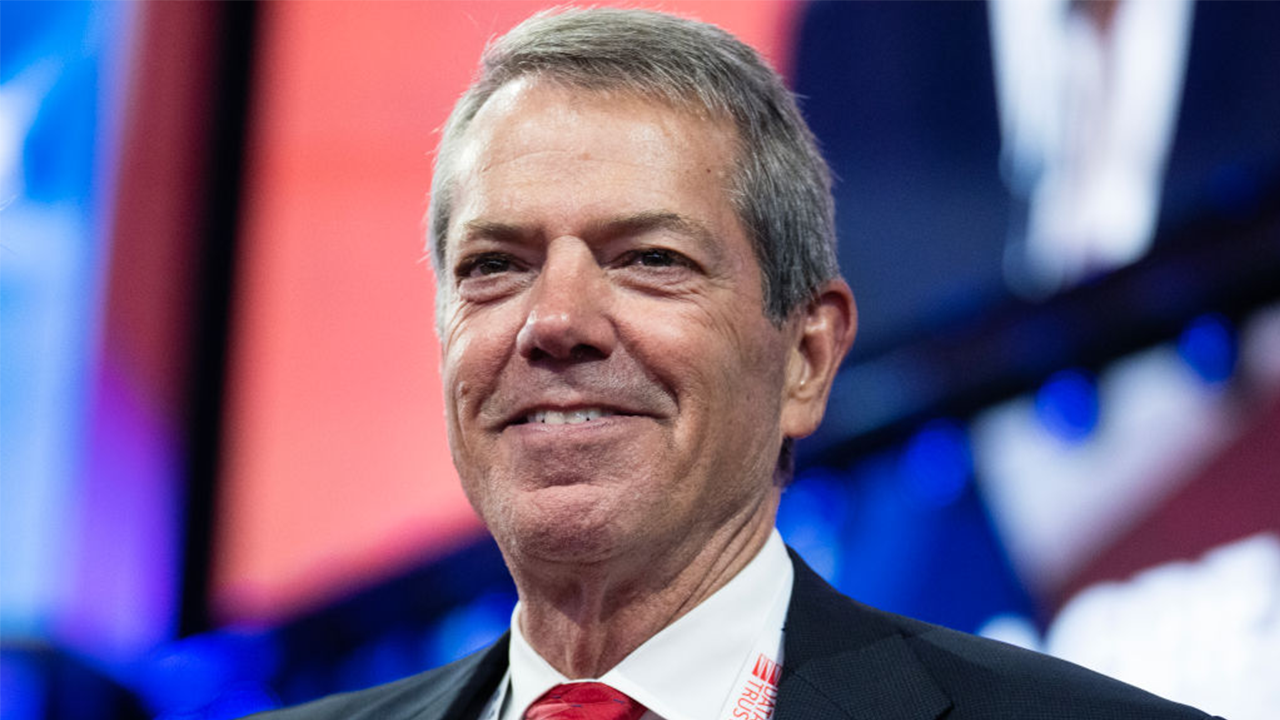World
Four Hajj delegations leave besieged Gaza to Mecca

Gaza – Over the past week, four batches of pilgrims departed from the Gaza Strip for Saudi Arabia to perform the rituals of Hajj.
About 6,600 people from Gaza and the West Bank left for Mecca to perform Hajj for 2023.
According to the Ministry of Endowments and Religious Affairs, the pilgrims travelled from Gaza during a four-day span, with 900 pilgrims in the first group, 900 on the second, 600 in the third, and 500 pilgrims on the fourth day.
Those travelling from the West Bank will get to Saudi Arabia through Jordan, while residents of the Gaza Strip went through Egypt.
The journey from Gaza Strip to Mecca starts from the Rafah land crossing, passing through Cairo’s airport, and from there to King Abdulaziz bin Saud Airport in Jeddah, and then to Mecca.

The Hajj is the annual Muslim pilgrimage to Mecca, required for all adult Muslims at least once.
Every year, millions of Muslims converge in Saudi Arabia to perform Hajj. Palestinians, especially those in besieged Gaza, often run into obstacles and delays because of Israeli restrictions.

In final pre-Hajj preparations, Fathia al-Hassanat, 58, from Khan Yunis south of the Gaza Strip, expressed her joy to perform the Hajj after a long wait.
“My feeling is indescribable. I had been hoping to perform Hajj for many years. Thank God, my name appeared in this year’s lottery,” said al-Hassanat, sitting next to her children who gathered the night before her travel.
At the same time, like other travellers in the Gaza Strip, al-Hassanat does not hide her concern about the difficulty of travelling through the Rafah crossing and the long hours of waiting until arriving at the Cairo airport.
“One of the greatest inconveniences in our lives as Palestinians in Gaza is that we have to spend more than 20 hours travelling from Gaza to Cairo, sometimes, to reach our destination. Our colleagues in the second regiment took a full 24 hours to reach the airport,” al-Hasnat added.
“Travelling from Gaza is a piece of torture, especially since most of the pilgrims are elderly and some of them suffer from chronic diseases.”
“But what solaces us is reaching our destination to perform Hajj this year,” she added while preparing her luggage.
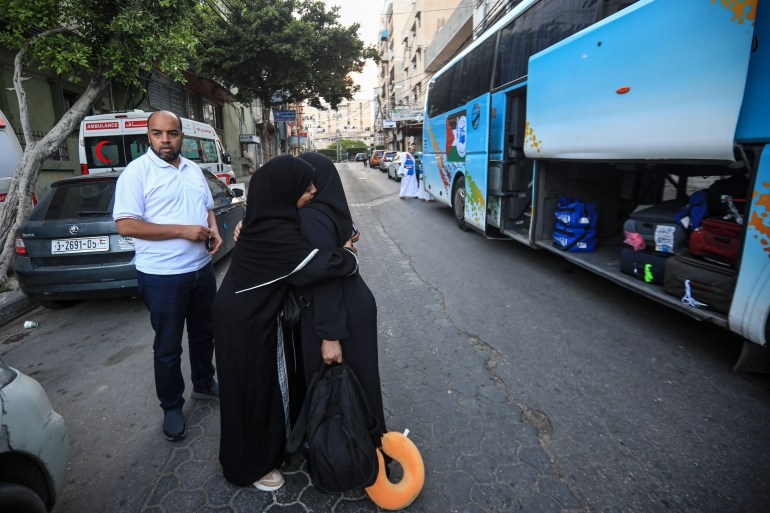
Ahmed Abu al-Kass, 41, tried to register for Hajj five years ago without success, but this year, his name appeared on the list.
“When I received a phone call informing me that my name was accepted for Hajj, I cried out of joy,” Abu al-Kass said. “It was a great moment. I am excited about the spiritual atmosphere in Hajj, and we hope to God that our Hajj will be accepted.”
Abu al-Kass, who suffers from a chronic bone disease, has not tried the journey through the Rafah crossing before. He said he is worried because of what he hears about the obstacles to travelling through the Rafah crossing and long hours on the road, which may not be good for his health condition.
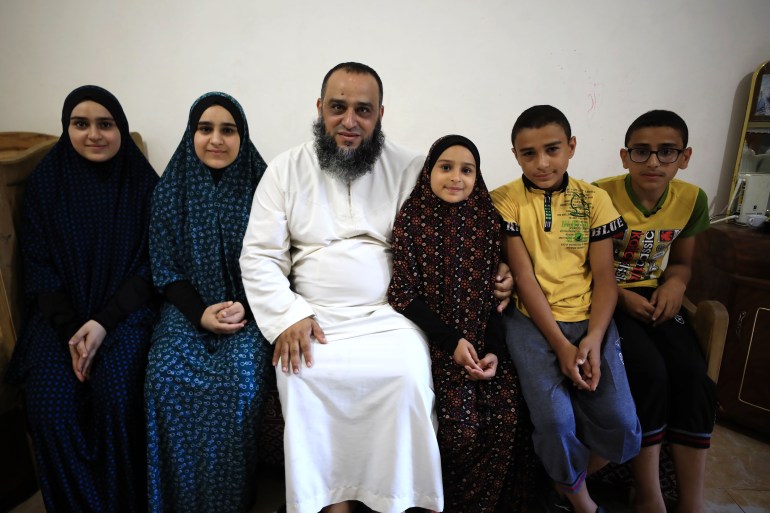
“Nevertheless, I am optimistic because we have heard about facilities for pilgrims’ travel by the Egyptian authorities. We hope this will be the case until we arrive in the airport.”
Abu al-Kass also referred to the high cost of Hajj, which is not commensurate with the difficult and deteriorating economic conditions in the Gaza Strip.

“I was collecting money penny by penny until I fulfilled my dream of performing Hajj. It was never easy, especially with responsibilities, children and a family, but they are all happy for me,” said Abu al-Kass surrounded by his five kids.
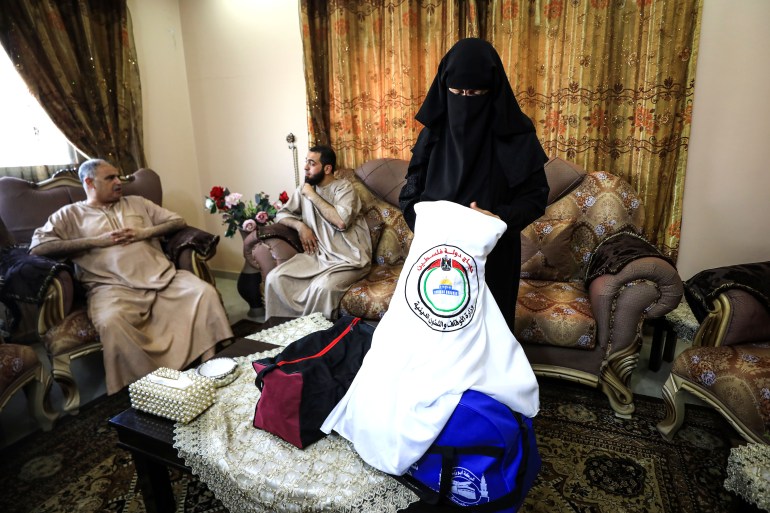
Samah al-Shurafa, 48, lost hope of going for Hajj this year because her name did not appear in the travel lottery twice. But luckily, her name appeared on the sick-people list as she is a cancer patient.
“I was diagnosed with cancer a year ago. I suffered a lot,” al-Shurafa told Al Jazeera while sitting in her home.
“So I wanted to register to relieve myself. I registered on the general lists and on the patient list. Alhamdolliah, my name lastly appeared with my eldest son, who is 30 years old.”
Under the lottery system introduced by Saudi Arabia, pilgrims are asked to apply online if they wish to perform Hajj. People are selected based on an electronic draw system.
In 2022, Saudi Arabia allowed one million pilgrims from around the world – including 850,000 foreigners.
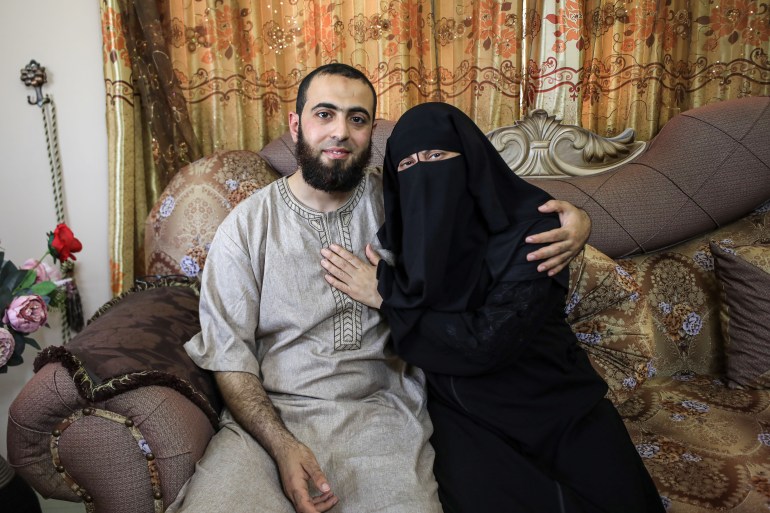

Al-Shurafa did not express any reservations about travelling through the Rafah crossing, despite the long distance from the Gaza Strip to Cairo.
“I am excited about Hajj this year, and I hope to God that it will be a year of goodness and blessings, and the conditions in the Gaza Strip will improve and the complexities of the blockade and other life’s troubles will end.”
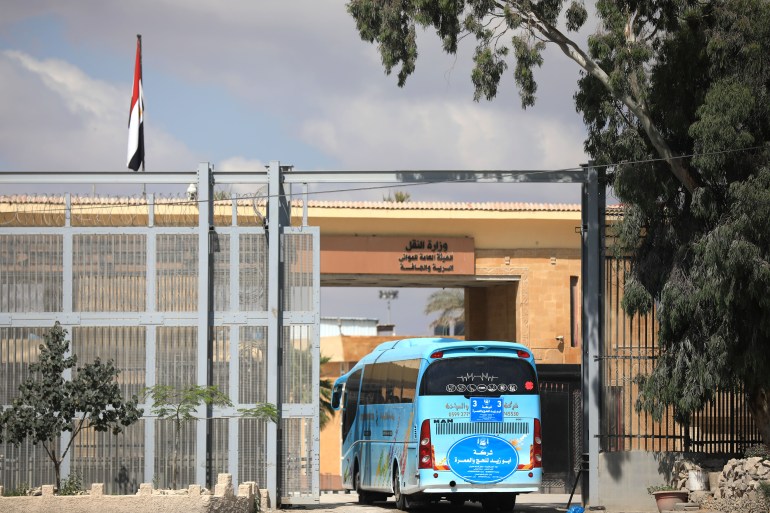

World
What a merger between Nissan and Honda means for the automakers and the industry
BANGKOK (AP) — Japanese automakers Honda and Nissan will attempt to merge and create the world’s third-largest automaker by sales as the industry undergoes dramatic changes in its transition away from fossil fuels.
The two companies said they had signed a memorandum of understanding on Monday and that smaller Nissan alliance member Mitsubishi Motors also had agreed to join the talks on integrating their businesses. Honda will initially lead the new management, retaining the principles and brands of each company.
Following is a quick look at what a combined Honda and Nissan would mean for the companies, and for the auto industry.
An industry shakeup
The ascent of Chinese automakers is rattling the industry at a time when manufacturers are struggling to shift from fossil fuel-driven vehicles to electrics. Relatively inexpensive EVs from China’s BYD, Great Wall and Nio are eating into the market shares of U.S. and Japanese car companies in China and elsewhere.
Japanese automakers have lagged behind big rivals in EVs and are now trying to cut costs and make up for lost time.
Nissan, Honda and Mitsubishi announced in August that they will share components for electric vehicles like batteries and jointly research software for autonomous driving to adapt better to dramatic changes in the auto industry centered around electrification. A preliminary agreement between Honda, Japan’s second-largest automaker, and Nissan, third largest, was announced in March.
A merger could result in a behemoth worth about $55 billion based on the market capitalization of all three automakers.
Joining forces would help the smaller Japanese automakers add scale to compete with Japan’s market leader Toyota Motor Corp. and with Germany’s Volkswagen AG. Toyota itself has technology partnerships with Japan’s Mazda Motor Corp. and Subaru Corp.
What would Honda need from Nissan?
Nissan has truck-based body-on-frame large SUVs such as the Armada and Infiniti QX80 that Honda doesn’t have, with large towing capacities and good off-road performance, said Sam Fiorani, vice president of AutoForecast Solutions.
Nissan also has years of experience building batteries and electric vehicles, and gas-electric hybird powertrains that could help Honda in developing its own EVs and next generation of hybrids, he said.
“Nissan does have some product segments where Honda doesn’t currently play,” that a merger or partnership could help, said Sam Abuelsamid, a Detroit-area automotive industry analsyt.
While Nissan’s electric Leaf and Ariya haven’t sold well in the U.S., they’re solid vehicles, Fiorani said. “They haven’t been resting on their laurels, and they have been developing this technology,” he said. “They have new products coming that could provide a good platform for Honda for its next generation.”
Why now?
Nissan said last month that it was slashing 9,000 jobs, or about 6% of its global work force, and reducing global production capacity by 20% after reporting a quarterly loss of 9.3 billion yen ($61 million).
Earlier this month it reshuffled its management and its chief executive, Makoto Uchida, took a 50% pay cut to take responsibility for the financial woes, saying Nissan needed to become more efficient and respond better to market tastes, rising costs and other global changes.
Fitch Ratings recently downgraded Nissan’s credit outlook to “negative,” citing worsening profitability, partly due to price cuts in the North American market. But it noted that it has a strong financial structure and solid cash reserves that amounted to 1.44 trillion yen ($9.4 billion).
Nissan’s share price has fallen to the point where it is considered something of a bargain. A report in the Japanese financial magazine Diamond said talks with Honda gained urgency after the Taiwan maker of iPhones Hon Hai Precision Industry Co., better known as Foxconn, began exploring a possible acquisition of Nissan as part of its push into the EV sector.
The company has struggled for years following a scandal that began with the arrest of its former chairman Carlos Ghosn in late 2018 on charges of fraud and misuse of company assets, allegations that he denies. He eventually was released on bail and fled to Lebanon.
Honda reported its profits slipped nearly 20% in the first half of the April-March fiscal year from a year earlier, as sales suffered in China.
More headwinds
Toyota made 11.5 million vehicles in 2023, while Honda rolled out 4 million and Nissan produced 3.4 million. Mitsubishi Motors made just over 1 million. Even after a merger Toyota would remain the leading Japanese automaker.
All the global automakers are facing potential shocks if President-elect Donald Trump follows through on threats to raise or impose tariffs on imports of foreign products, even from allies like Japan and neighboring countries like Canada and Mexico. Nissan is among the major car companies that have adjusted their supply chains to include vehicles assembled in Mexico.
Meanwhile, analysts say there is an “affordability shift” taking place across the industry, led by people who feel they cannot afford to pay nearly $50,000 for a new vehicle. In American, a vital market for companies like Nissan, Honda and Toyota, that’s forcing automakers to consider lower pricing, which will eat further into industry profits.
____
AP Auto Writer Tom Krisher contributed to this report from Detroit.
World
US military conducts successful airstrikes on Houthi rebel forces in Yemen
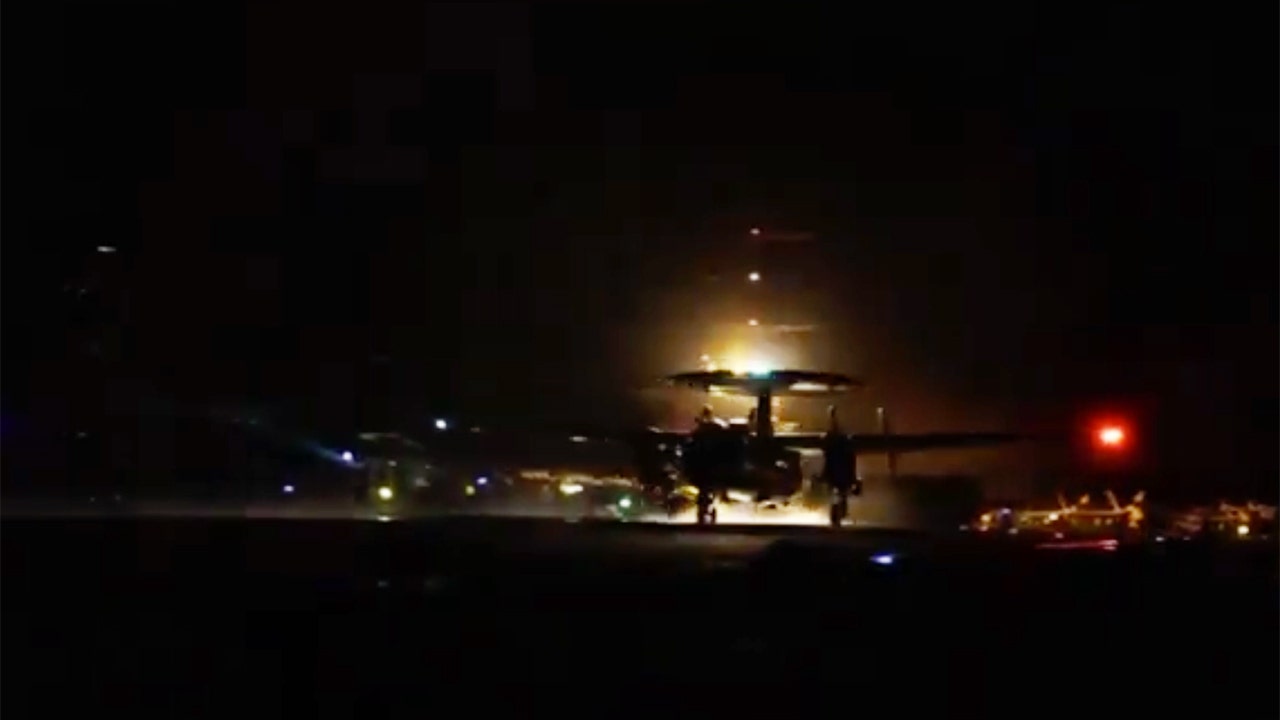
The U.S. military confirmed it conducted airstrikes in Yemen, saying it targeted a missile storage site and a command-and-control center operated by Iran-backed Houthi rebels.
U.S. Central Command (CENTCOM) announced the successful strikes in a release Saturday, saying they were meant to “disrupt and degrade” Houthi operations.
“CENTCOM forces conducted the deliberate strikes to disrupt and degrade Houthi operations, such as attacks against U.S. Navy warships and merchant vessels in the Southern Red Sea, Bab al-Mandeb and Gulf of Aden,” CENTCOM said in a news release.
DISAPPROVAL MOUNTS BOTH AT HOME AND ABROAD AS US AVOIDS DIRECT ACTION AGAINST HOUTHI REBELS
The U.S. military successfully conducted airstrikes in Yemen, saying it targeted a missile storage site and a command-and-control site operated by Iran-backed Houthi rebels. (CENTCOM via X)
Footage from CENTCOM showed F/A-18’s taking off. The agency said it also used assets from the Navy and the Air Force.
US NAVY SHIPS REPEL ATTACK FROM HOUTHIS IN GULF OF ADEN
“The strike reflects CENTCOM’s ongoing commitment to protect U.S. and coalition personnel, regional partners and international shipping,” it said.
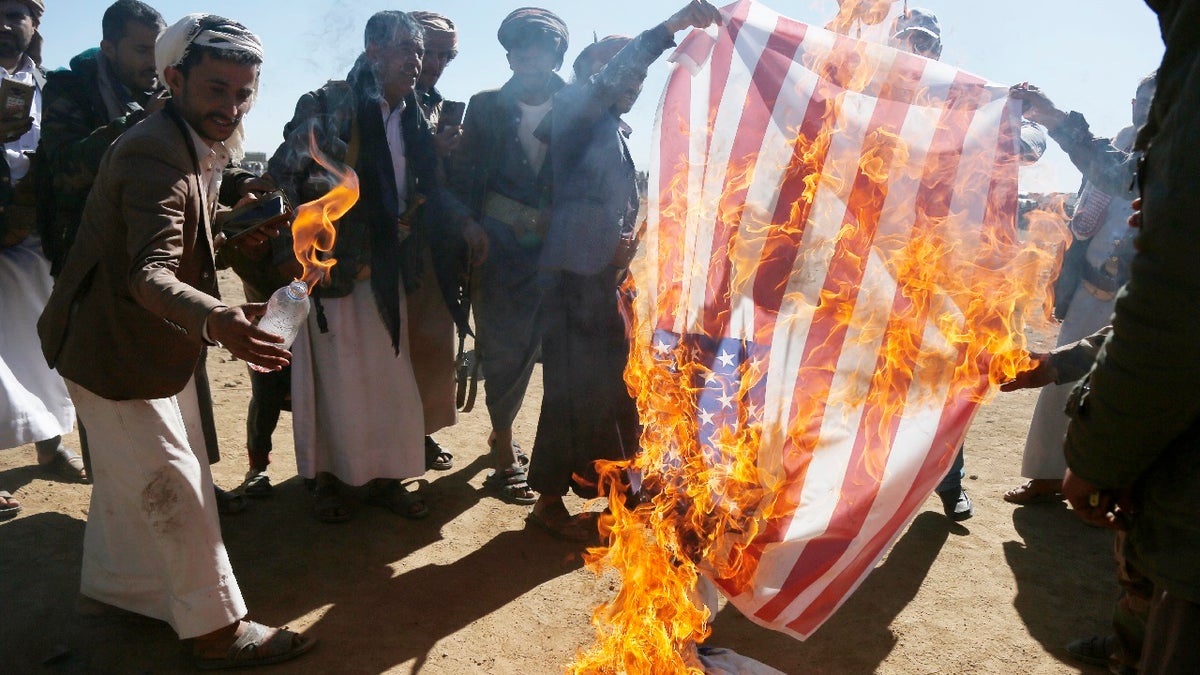
Houthi followers burn the Israeli and American flags on the outskirts of Sana’a, Yemen. (Mohammed Hamoud/Getty Images)
The attacks against shipping are ongoing, and Houthi militants have vowed to continue until Israel ends its campaign in Gaza.
The terrorist group has targeted more than 100 merchant vessels since the start of the Israel-Hamas war in October 2023.
World
Fact check: How deadly was 2024 for journalists?

An estimated 104 journalists lost their lives in 2024, with Palestine the most dangerous territory.
An estimated 104 journalists were killed worldwide over the past year, according to data shared earlier this month by the International Federation of Journalists (IFJ).
Another report by NGO Reporters Without Borders (RSF) puts the figure at 54, but its methodology means it only includes killings that are considered “directly related” to journalists’ professional activity.
Both organisations say that Palestine is the deadliest place on earth for journalists. More than half (55) of the 104 killings reported by IFJ were Palestinian media professionals in Gaza, while a further six were killed in Lebanon.
At least 138 journalists have been killed in Gaza since the war between Israel and Hamas broke out on 7 October 2023, making the country one of the “most dangerous in the history of modern journalism, behind Iraq, the Philippines and Mexico,” according to the IFJ.
Reporters without Borders has described the number of killings in Gaza as “an unprecedented bloodbath”.
Israel firmly denies it has intentionally targeted any journalists, but has recognised some that have been killed in its airstrikes on Gaza.
The 104 total killings reported by the IFJ is a slight decrease on the 129 they reported on in 2023, which is considered the bloodiest year for journalists since 1990.
How do other world regions fare?
Asia Pacific is the world’s second most dangerous region for journalists, after the Middle East, according to the IFJ.
It recorded 20 deaths in the region in 2024, of which 70% happened in the southern Asian countries of Pakistan, Bangladesh and India.
The region has seen an “upsurge” in violence, according to the IFJ, with deaths increasing sharply from the 12 recorded in 2023.
Africa was the third most dangerous region for journalists at eight deaths, five of them in war-torn Sudan.
The number of journalists killed in south, central and north America has dropped sharply over the past two years, from 30 in 2022 to six in 2023, and another six in 2024. Mexico, considered to be one of the deadliest places in the world to do journalism, continues to see “threats, intimidation, kidnappings and murders” against journalists, particularly due to reporting on drug trafficking.
Number of journalists behind bars on the rise
According to IFJ estimates on 10 December, there were 520 journalists in prison across the world, considerably more than in 2023 (427) and 2022 (375).
China, including Hong Kong, accounts for most of journalists behind bars, followed by Israel and Myanmar.
The IFJ says the figures show how “fragile” the independent press is and how “risky and dangerous” the profession of journalism has become.
-

 Politics1 week ago
Politics1 week agoCanadian premier threatens to cut off energy imports to US if Trump imposes tariff on country
-
/cdn.vox-cdn.com/uploads/chorus_asset/file/25789444/1258459915.jpg)
/cdn.vox-cdn.com/uploads/chorus_asset/file/25789444/1258459915.jpg) Technology1 week ago
Technology1 week agoOpenAI cofounder Ilya Sutskever says the way AI is built is about to change
-

 Politics1 week ago
Politics1 week agoU.S. Supreme Court will decide if oil industry may sue to block California's zero-emissions goal
-
/cdn.vox-cdn.com/uploads/chorus_asset/file/25546252/STK169_Mark_Zuckerburg_CVIRGINIA_D.jpg)
/cdn.vox-cdn.com/uploads/chorus_asset/file/25546252/STK169_Mark_Zuckerburg_CVIRGINIA_D.jpg) Technology1 week ago
Technology1 week agoMeta asks the US government to block OpenAI’s switch to a for-profit
-

 Business1 week ago
Business1 week agoFreddie Freeman's World Series walk-off grand slam baseball sells at auction for $1.56 million
-
/cdn.vox-cdn.com/uploads/chorus_asset/file/23951353/STK043_VRG_Illo_N_Barclay_3_Meta.jpg)
/cdn.vox-cdn.com/uploads/chorus_asset/file/23951353/STK043_VRG_Illo_N_Barclay_3_Meta.jpg) Technology1 week ago
Technology1 week agoMeta’s Instagram boss: who posted something matters more in the AI age
-
News1 week ago
East’s wintry mix could make travel dicey. And yes, that was a tornado in Calif.
-
/cdn.vox-cdn.com/uploads/chorus_asset/file/24924653/236780_Google_AntiTrust_Trial_Custom_Art_CVirginia__0003_1.png)
/cdn.vox-cdn.com/uploads/chorus_asset/file/24924653/236780_Google_AntiTrust_Trial_Custom_Art_CVirginia__0003_1.png) Technology2 days ago
Technology2 days agoGoogle’s counteroffer to the government trying to break it up is unbundling Android apps















